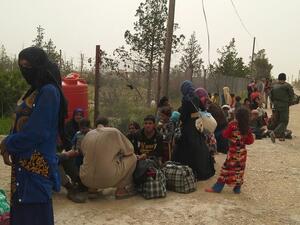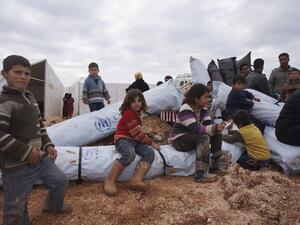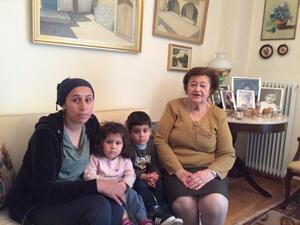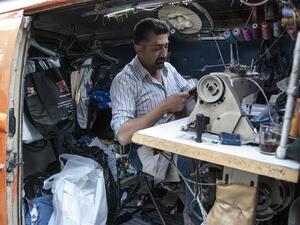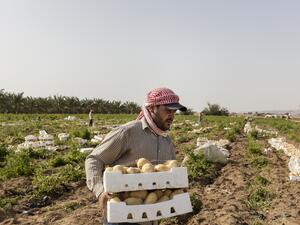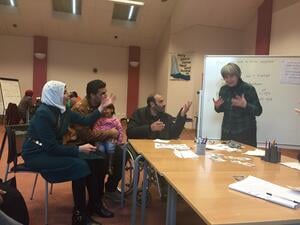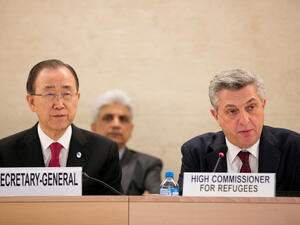Exodus continues from Syria, including some 10,000 Iraqis
Exodus continues from Syria, including some 10,000 Iraqis

Outreach worker registering a displaced Syrian family in Lebanon.
GENEVA, July 24 (UNHCR) - More than 10,000 Iraqis have returned home from Syria over the past week to escape the violence that is also causing thousands of Syrians to seek safety in safer districts or in neighbouring countries.
Many of the Iraqi returnees have said they are worried about going back to the country they fled, but felt they had little choice, given the worsening security situation in Syria.
UNHCR has increased the numbers of staff manning hotlines in Syria and they have been kept very busy. "We have heard [from callers] that refugees are running short of food and basic needs, including cooking gas. There is a need for medical care with many clinics closed," UNHCR's chief spokesperson told journalists in Geneva on Tuesday. "Many refugees report continued fear for their safety, particularly the women and children."
Aside from those who have returned home, thousands of other Iraqi refugees have had to relocate from the Damascus suburb of Seida Zeinab to other areas. Some cited direct threats to their safety, while others expressed a fear of being caught up in the violence.
The Iraqi government is supporting the return of Iraqi refugees with special flights. In addition, UNHCR is working with its regular transport company to increase return capacity for Iraqi refugees. More than 13,000 Iraqis left Syria in the first half of 2012, the majority returning to Iraq.
For the remaining refugee population, UNHCR is offering financial assistance so families can stockpile essential items in case access to services and shops is interrupted.
UNHCR's Fleming said that thousands of Syrians in the capital, Damascus, have also fled their homes for safer areas, with 58 schools now hosting Syrian families, as well as a number of parks becoming makeshift camps. "Some of these people are displaced for a second time, having fled Homs governorate for Damascus several months ago," she said.
The refugee agency's national partner, the Syrian Arab Red Crescent, has helped to deliver thousands of blankets, mattresses and essential household items to these areas in the past few days.
Meanwhile, Fleming said that UNHCR welcomed the announcement by Iraqi Prime Minister Nouri al Maliki that Syrians fleeing the violence will be allowed free access into Iraq. More than 7,500 Syrians are registered in Iraq, with around 500 awaiting registration. The majority are living in the Kurdistan region.
The Lebanese government also maintains open borders for Syrian refugees and UNHCR estimates that 18,000 crossed last Wednesday and Thursday, but the numbers decreased over the weekend.
Monday witnessed another increase of approximately 6,000 new arrivals through the Masna border crossing. Many told UNHCR that they expected to stay in Lebanon for several weeks and return when calm returns to Damascus or the town of Homs.
To date UNHCR has registered some 30,000 Syrian refugees in Lebanon, with 2,500 awaiting registration. It is unlikely that all of the new arrivals will register with UNHCR immediately. In general, those that need assistance are the first to come forward to be registered. Based on preliminary assessments, relatively few of the most recent arrivals are in need of humanitarian assistance at this stage.
In Jordan, close to 36,000 Syrian refugees are registered, with a further 2,500 awaiting registration. According to the authorities, there are tens of thousands of Syrians who have not yet come forward for registration.
On Monday, transit facilities designed for around 2,000 people were packed with 6,000 people. Overnight, more than 1,200 Syrians crossed into Jordan, mostly from Daraa. Thousands are due to be moved to a new camp at Za'atri.
In Turkey, the number of Syrian refugees now stands at more than 44,000. The Turkish authorities are constructing two new camps to increase the capacity of the camps by a minimum of 20,000 people. Significant numbers of Syrian Turkmen have arrived in the past week.

